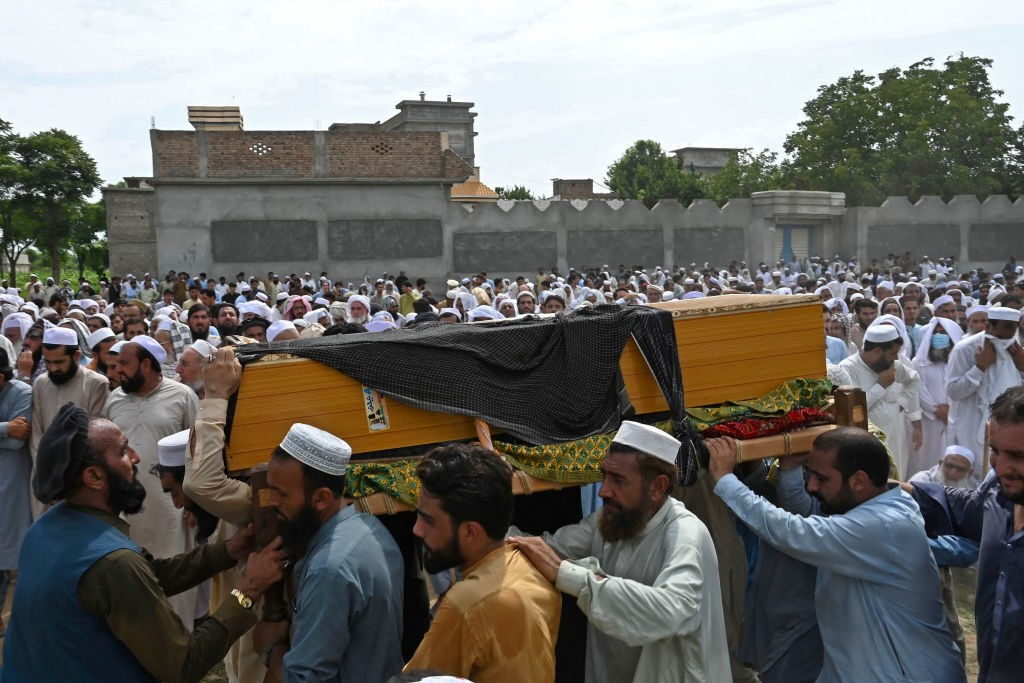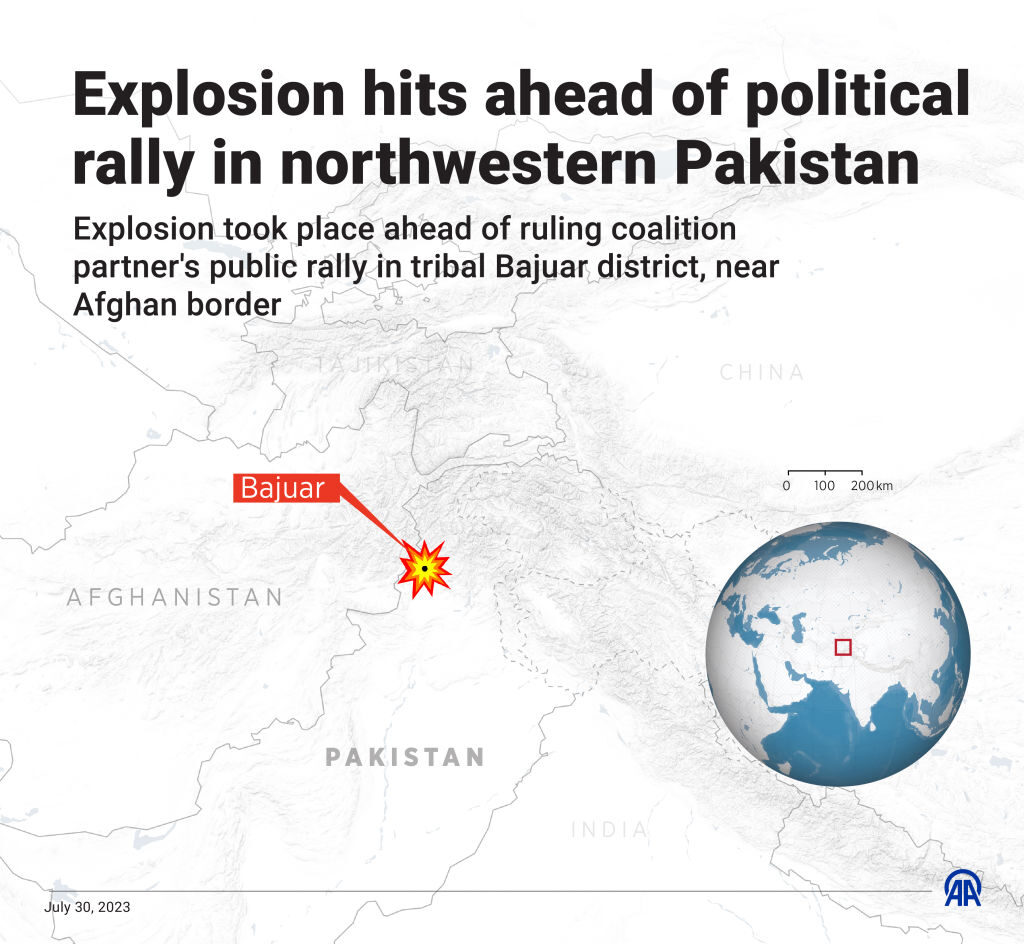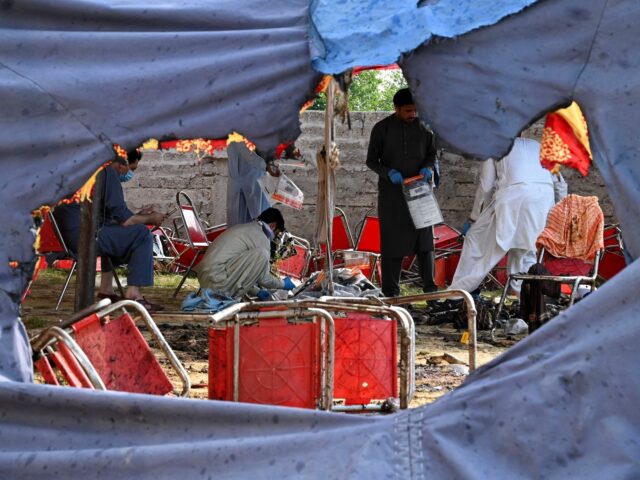A suspected suicide bombing killed at least 46 people and injured over 150 at an Islamist political event near the Afghan border in Khyber Pakhtunkhwa (KP), Pakistan, on Sunday, believed to have been attended by hundreds of people.
The event was a convention for the Islamist political party Jamiat Ulema-e-Islam Pakistan Fazl (JUI-F), an Islamist party local outlets described as “hardline” whose name roughly translates to the “Assembly of Islamic Clerics.” Police told reporters on Monday that, while no individual or group has taken responsibility for the bombing, the prime suspect is the Islamic State’s Afghan offshoot, Khorasan Province (ISIS-K).
Analysts speculated that ISIS-K targeted the JUI-F because it participates in Pakistani elections, is relatively popular in the Afghan border area of Pakistan, and poses a challenge to ISIS-K’s attempts to recruit members.
Political violence is common in Pakistan, which has seen throngs of radical Islamists take the streets for months in defense of ousted Islamist Prime Minister Imran Khan. Khan himself was shot in the leg during a political rally in November.

People carry the coffin of a victim who died in a bomb blast in Bajaur district of Khyber-Pakhtunkhwa province on July 31, 2023.(ABDUL MAJEED/AFP via Getty Images)
JUI-F is a regional power currently allied with the government of Prime Minister Shehbaz Sharif, the “establishment” leader who replaced Khan after he was removed prior to the end of his term in a no-confidence vote last year.
The Islamic State, however, has not been prominent in the country. Officers indicated that the Taliban takeover in neighboring Afghanistan, the result of American President Joe Biden extending the 20-year war in Afghanistan beyond an agreed-upon end date in 2021, has allowed ISIS-K to expand its footprint in the region. Pakistan also contends with its own Taliban, the Tehrik-e Taliban Pakistan (TTP), which operates separately from the Afghan Taliban, now formerly identifying as the “Islamic Emirate of Afghanistan.”
The Pakistani newspaper Dawn reported on Monday that authorities had documented 46 people dying from injuries related to what police are now confident was a suicide bombing at the JUI-F convention in the Bajaur district of KP.
Warning – Graphic Image:
“According to eyewitnesses, hundreds of party workers along with local leaders were present at the gathering when the blast occurred,” Dawn narrated. “The bomb went off when a party leader was addressing the convention. JUI-F officials told Dawn that the party’s Khar General Secretary Ziaullah, JUI-F District Press Secretary Mujahid Khan and his son were among the dead.”
Dawn reported that five children were among those confirmed dead in the event.
The Pakistan Express Tribune quoted a local police official who said they had not identified the suicide bomber by name, but believed the man was sitting in the front rows before the stage where JUI-F officials were speaking. Officials believe about ten kilograms (22 pounds) of explosives were used in the attack.
Following Sunday’s initial reports, the Press Trust of India (PTI) quoted local officials has concluding that ISIS-K was the likely culprit behind the attack.
“We are still investigating and gathering information on the Bajaur blast. The Initial probe shows that banned outfit Daesh (ISIS) was involved,” an unnamed police officer reportedly told the Pakistani outlet Geo News. Dawn similarly reported that its police sources believed the Islamic State had orchestrated the attack.

An infographic details where the deadly explosion took place ahead of ruling coalition partner’s public rally in tribal Bajuar district, near Afghan border. (Photo by Omar Zaghloul/Anadolu Agency via Getty Images)
“There is no question about it,” an unnamed police officer told Dawn about Islamic State involvement in the attack. The newspaper observed that local counter-terrorist officials had documented the presence of ISIS-K jihadists in the Afghan border region as recently as June of this year.
Dawn reported to have had a journalist present at the rally, allowing the newspaper a greater first-hand reporting ability. Eyewitnesses described to the newspaper harrowing scenes as the bomb tore people apart.
“There was utter confusion, with human flesh, limbs, and body parts scattered throughout the area, alongside lifeless bodies,” a victim identified as 24-year-old Sabeehullah, told Dawn. “I found myself lying next to someone who had lost their limbs. The air was filled with the smell of human flesh.”
Sabeehullah reportedly fractured his arm in the attack.
Another witness told the newspaper that he heard shots fired in the chaos, but it was unclear exactly who was shooting and at what. That witness, Rahim Shah, estimated 500 people were in the tightly packed event tent when the bomb went off.
Shehbaz Sharif and Imran Khan both issued statements of condolence following the attack. The head of the JUI-F, Maulana Fazlur Rehman, urged supporters to “stay peaceful and immediately reach the hospital to donate blood for the injured people.”
JUI-F leader Hafiz Hamdullah issued a separate statement on a Geo News broadcast: “I strongly condemn the blast and want to give a message to the people behind it that this is not jihad but terrorism.”
The Pakistani news organization Aaj English cited experts who suggested that ISIS-K targeted JUI-F because it presented an alternative jihadi vision that involves participation in elections and other political activity, rather than the complete overthrow of established governments.
“Just as IS is the rival of the Afghan Taliban in Afghanistan, it is the rival of JUI in Pakistan. Their problem is with the JUI, so they hit it wherever and however they can,” one expert, Rustam Shah Mohmand, posed.
Another expert, journalist Iftikhar Firdous, recalled to Aaj English that JUI-F issued a fatwa against the Islamic State when it first announced a “caliphate” in Afghanistan.
Zabihullah Mujahid, the top spokesman of the Afghan Taliban, issued a statement of condolence to the JUI-F on Sunday.
“The Islamic Emirate condemns the blast that took place at a Jamiat Ulema-e-Islam program in Bajaur, Khyber Pakhtunkhwa, Pakistan,” Mujahid wrote. “The Islamic Emirate expresses its deepest condolences to the bereaved families and prays for Jannah al-Firdous [paradise] for the martyrs and speedy recovery of the injured. Such crimes are not justified or justified in any way.”
The Afghan Taliban has experienced a similar wave of ISIS-K attacks against it since it seized power in Afghanistan two years ago. Islamic State jihadis have been especially prolific in attacking sites owned and frequented by Chinese businessmen, in the country as the Taliban seeks expanded commercial ties to the Communist Party across its northeastern border.
Three months into the Taliban’s rule, in November 2021, the United Nations reported that ISIS-K was present in every Afghan province. In December, the Islamic State took responsibility for the high-profile bombing of a hotel known to cater to Chinese visitors, killing three and injuring 21. ISIS terrorists reject cooperation with China and have in the past called for attacks on the Communist Party on the grounds that it is explicitly atheist.
China is also currently committing genocide against Muslim populations in East Turkistan, a fact the Afghan Taliban ignores.
On the other side of the Afghan-Pakistani border, experts have documented a notable rise in terrorist attacks this year in what has historically been a violent region, described by Dawn as “once a focal point in the global war on terror.”
A report released this month by think tank Pakistan Institute for Conflict and Security Studies said the first half of the current year witnessed a steady and alarming rise in terror and suicide attacks, claiming the lives of 389 people across the country,” the newspaper reported.

COMMENTS
Please let us know if you're having issues with commenting.